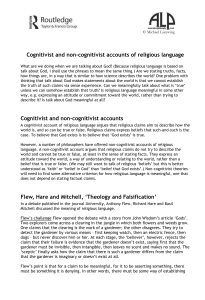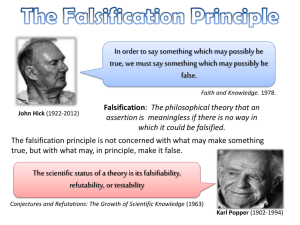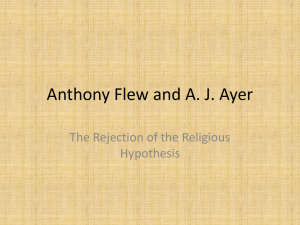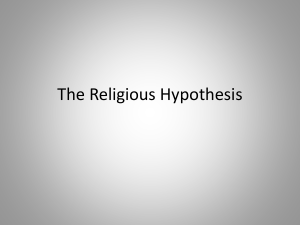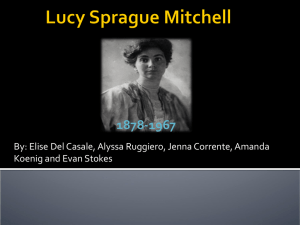File
advertisement
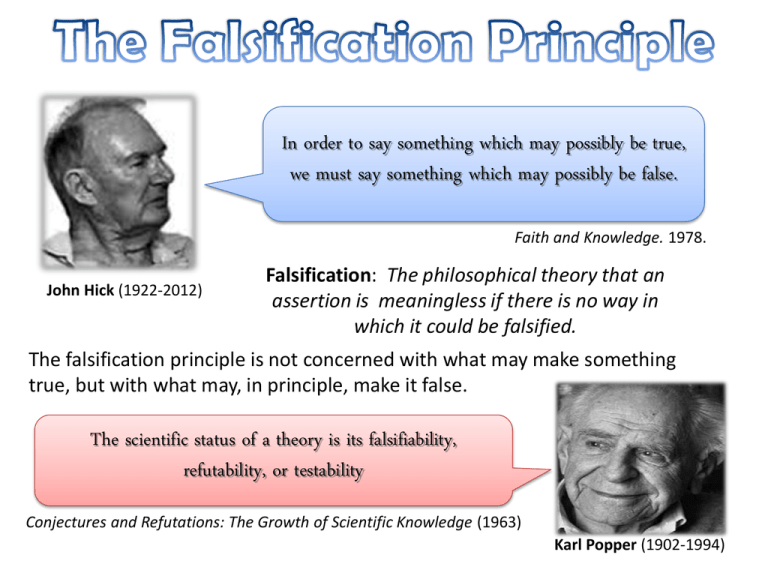
In order to say something which may possibly be true, we must say something which may possibly be false. Faith and Knowledge. 1978. John Hick (1922-2012) Falsification: The philosophical theory that an assertion is meaningless if there is no way in which it could be falsified. The falsification principle is not concerned with what may make something true, but with what may, in principle, make it false. The scientific status of a theory is its falsifiability, refutability, or testability Conjectures and Refutations: The Growth of Scientific Knowledge (1963) Karl Popper (1902-1994) An example of Popper’s was astronomy against astrology... Albert Einstein's theory of gravity was a scientific theory as it was potentially falsifiable, meaning the truth or falseness of it could be tested against empirical observations of the universe. However, the claims of the mystic astrologers make their prophecies so vague that they are able to explain away anything that might refute their predictions had they been more precise ‘In order to escape falsification they destroyed the testability of their theory.’ (Popper) If this principle is applied to religious belief than falsification draws in to question the nature of claims such as ‘Jesus was the incarnation of God’ or ‘God loves me’. If these claims are scientific they must be able to be scrutinised against sense observations and thus potentially be falsified. Task: in groups of two continue this conversation... Person A; ‘God loves all people’. Person B; ‘Then why does he allow them to suffer?’... In 1955 the falsification theory was discussed by Antony Flew, R.M. Hare and Basil Mitchell in an article titled ‘Theology and Falsification: Symposium’ in the Journal ‘New Essays in Philosophical Theology.’ Flew’s position: Theological utterances are not assertions; they have no cognitive meaning Hare’s position: Flew is right to say theological utterances are not assertions, however, they are ‘bliks’ and so are meaningful Mitchell’s position: Theological utterances are meant as assertions and they are very meaningful to those who hold onto them. (1923-2010) Flew stated that it often seems to the non-religious there is no event or series of events that would ever convince the ‘sophisticated religious person’ that ‘There wasn’t a God after all’. (Flew, Theology & Falsification: A Symposium, 1955) Once upon a time two explorers came upon a clearing in the jungle. In the clearing were growing many flowers and many weeds. One explorer says, ‘Some gardener must tend this plot’. The other disagrees, ‘There is no gardener’. So they pitch their tents and set a watch. No gardener is ever seen. ‘But perhaps he is an invisible gardener.’ So they set up a barbed-wire fence. They electrify it. They patrol with bloodhounds (For they remember how H.G. Wells’s The Invisible Man could be both smelt and touched though he could not be seen). But no shrieks ever suggest that some intruder has received a shock. No movements of the wire ever betray an invisible climber. The bloodhounds never give cry. Yet still the Believer is not convinced. ‘But there is a gardener, invisible, intangible, insensible to electric shocks, a gardener who has no scent and makes no sound, a gardener who comes secretly to look after the garden which he loves.’ At last the Sceptic despairs, ‘But what remains of our original assertion? Just how does what you call an invisible, intangible, eternally elusive gardener differ from an imaginary gardener or even from no gardener at all?’ Flew’s argument is that religious believers act in the same way as the believing explorer. Flew gives the example of saying God loves people, even if disaster happens. His argument is that people still go on believing in the loving God. No experience seems to falsify a religious believer’s faith. Flew therefore argues that God-talk is meaningless as it is unfalsifiable, in the same way as the eternally elusive gardener in his analogy. Flew suggested that God died a ‘death by a thousand qualifications’. By this phrase, Flew meant that when a religious believer is challenged about the existence of God, or God’s nature, their response is to modify the way they talk about God to respond to the challenge, that is, they try to qualify (explain/justify) what it is they have said by changing, altering or explaining what they have said by using an equally vague and unfalsifiable statement). Flew argues that believers end up modifying their statements about God so much when challenged, that the statements no longer resemble the original claim about God – in other words, their belief in God dies a ‘death by a thousand qualifications’. Task: Look at the first statement then consider how the second challenges it. (a) God is all-loving (a) Human beings have free will (b) God is all-powerful (b) God did not prevent hurricane Katrina (c) God answers the prayers of his faithful (c) People pray for healing and it does not happen (d) God loves us (d) Many evil people have good lives, whilst good people suffer (e) Gods Creation is good (e) Nature is indifferent to humanity’s existence Q. Can the religious believer challenge Flew without proving him right? Author Story Parable of the Anthony Two Flew Explorer s in the Jungle Outline of the Story One of the explorers repeatedly modifies the qualities he attributes too an alleged gardener who looks after the forest clearing. Flew used the parable to suggest that religious believers refuse to let their beliefs be falsified, instead, when challenged, religious believers qualify their belief, altering it to avoid the criticism. Flew argues that eventually the original belief is lost, “dying a death of a thousand qualifications” Implication If Flew’s analogy is an accurate description of religious belief this is a serious challenge to a believer’s faith claims as it suggests that: 1. Faith claims are an incorrect and irrational interpretation of the world that goes against the evidence 2. Religious believers refuse to accept that their beliefs are irrational as they keep qualifying them Possible Response Religious belief statements are potentially falsifiable. Religious believers do no continually qualify their beliefs, instead religious believers clarify and state their beliefs more clearly e.g. the freewill defence is an explanation of belief in God and Freewill, it cannot be dismissed as a qualification Peter Donovan noted that: “The sense of knowing is never on its own a sufficient sign of knowledge … But if the sense of God fails, in the end, to count as knowledge of God, what is to be said about it? Is it of no further philosophical interest and to be discarded, like a pricked balloon, as being simply a great illusion? Nothing that has been said here leads to that conclusion. There is no justification for taking such an all-or-nothing view of religious experience” (Interpreting Religious Experience, 1979) (1919-2002) R.M. Hare did not start by contradicting Flew’s argument, in fact he states in his section of the Symposium; ‘I must begin by confessing that, on the ground marked out by Flew, he seems to me to be completely victorious.’ However, this does not mean Hare is in complete agreement with Flew (notice the ‘on the grounds marked out by Flew’). Hare uses a parable of his own to suggest that Flew is standing on the wrong ground to be able to understand religious assertions. A certain lunatic is convinced that all dons want to murder him. His friends introduce him to all the mildest and most respectable dons that they can find, and after each of them has retired, they say, ‘You see, he doesn’t really want to murder you; he spoke to you in a most cordial manner; surely you are convinced now?’ But the lunatic replies ‘Yes, but that was only his diabolical cunning; he’s really plotting against me the whole time, like the rest of them; I know it I tell you’. However many kindly dons are produced, the reaction is still the same. Hare’s example outlined how the lunatic saw the world and nothing could change his view of the world. Hare notes that according to Flew’s criteria the lunatic’s assertion would be meaningless as there is no behaviour being demonstrated by the dons that would support his theory. He is referred to as a lunatic because his assumptions of the dons differs to that of everyone else. Hare coined the word ‘blik’ to describe the way in which people see and interpret the world (a ‘blik’ being a basic, unprovable assumption that gives explanation to the user). The important characteristic of the ‘blik’ is that it is not falsifiable and it does not make factual claims about the world that can be tested. No evidence of argument can demonstrate the falseness of a ‘blik’. Whilst the lunatic may have an insane ‘blik’ and we may have a sane ‘blik’, we both have a ‘blik’. For the lunatic to have a wrong ‘blik’ there must be a right ‘blik’. Holding the right ‘blik’ is what matters. Hare made two major points about Bliks, his parable of the lunatic and Flew: 1. ‘Bliks’ are ways of seeing the world and the difference between different people’s ‘bliks’ cannot be solved by observations of what the world is like. 2. Flew makes a mistake by treating religious statements as though they are scientific explanations (see Wittgentsein). Flew accepted Hare’s idea of ‘bilks’ (he even thanks him for introducing the concept to philosophy) but adds, Christianity does not rely on ‘bliks’ as part of their statement of faith stating ‘the man who reassures himself with theological arguments for immortality is being as silly as the man who tries to clear his overdraft by writing his bank a cheque on the same account.’ Flew states Christianity makes ‘assertions’ about the universe and God which form the basis of theological apologetics. To base your theology on a ‘blik’ would be make your religious activity fraudulent, or merely silly. When Christians claim God really did this, then by implications this claim is testable or falsifiable and so not merely a ‘blik’. Author RM Hare Story Parable of the Lunatic Who Believes the University Staff are Plotting to Kill Him Outline of the Story Hare uses the story to show that people have a way in which they see the world. Hare points out that Bliks may be ‘insane one’ or ‘sane ones’ but he also suggests, following David Hume, that there are no senseobservations available that will help resolve conflicting ‘bliks’. Equally, every person whether they are atheist, theist, agnostic, verificationist or falsificationist has a ‘Blik’ through which they view the world. Implication Hare’s lunatic story does not help traditional religious belief claims. If religious beliefs are bliks, this suggests that religious beliefs are an interpretation of the world which could be sane or insane. Possible Response Hare’s lunatic story would match antirealist views of religion as a form of life However, religious belief is more than just an approach to life. For many believers it is a belief in reality as it truly is. For traditional religious believers belief statements are not ways of seeing the world, but they are factual claims about how the world is and God’s relationship to the world. (1917-2011) Mitchell states that Flew makes errors in his analysis of the religious believer because the Christian attitude is not that of the detached observer, but of the believer. In time of war in an occupied country, a member of the resistance meets one night a stranger who deeply impresses him. They spend that night together in conversation. The Stranger tells the partisan that he himself is on the side of the resistance--indeed that he is in command of it, and urges the partisan to have faith in him no matter what happens. The partisan is utterly convinced at that meeting of the Stranger’s sincerity and constancy and undertakes to trust him. They never meet in conditions of intimacy again. But sometimes the Stranger is seen helping members of the resistance, and the partisan is grateful and says to his friends, ‘He is on our side’. Sometimes he is seen in the uniform of the police handing over patriots to the occupying power. On these occasions his friends murmur against him: but the partisan still says, ‘He is on our side’. He still believes that, in spite of appearances, the Stranger did not deceive him. Sometimes he asks the Stranger for help and receives it. He is then thankful. Sometimes he asks and does not receive it. Then he says, ‘The Stranger knows best’. Sometimes his friends, in exasperation, say ‘Well, what would he have to do for you to admit that you were wrong and that he is not on our side?’ But the partisan refuses to answer. He will not consent to put the Stranger to the test. And sometimes his friends complain, ‘Well, if that’s what you mean by his being on our side, the sooner he goes over to the other side the better’. Mitchell tackles Flew’s ‘dying a death of a thousand qualifications’ comment. He does this by using the same example as Flew that religious people assert God as loving whilst witnessing acts that seem contrary to this. For Mitchell statements like ‘It is God’s will’ (which Mitchell parallels with the ‘he is on our side’ statement from the partisan) would be thoughtless and insane (vacuous formulae) if the believer ‘blandly dismisses [what he witnesses] as of no consequence, having no bearing upon his belief.’ However, Mitchell states the believer ‘...experiences in himself the full force of the conflict.’ In other words puts what he sees into a wider context of the whole of his doctrine and becomes a ‘significant article of faith’. By this Mitchell agrees with Flew that religious utterances are not ‘bliks’ but indeed assertions. However, unlike Flew, Mitchell sees these assertions as explanations not an assertion ‘...so eroded by qualifications that it was no longer a qualification at all’ (Flew). In conclusion Mitchell states that significant utterances of Christian belief and doctrine can be treated in one of three ways... ‘God loves humanity’ is not conclusively falsifiable, but can by treated as follows: 1. As provisional hypotheses to be discarded if experience goes against them. 2. As significant articles of faith 3. As vacuous formulae (perhaps out of a desire for reassurance) to which experience makes no difference and which make no difference to life The Christian is precluded by his faith from taking up the first attitude: He is in constant danger, as Flew has observed, of slipping into the third. But he need not, and, if he does, it is a failure in faith as well as in logic. I still think that in the end, if relentlessly pursued’ [the theologian] will have to resort to the avoiding action of qualification. And there lies that death by a thousand qualifications which would be a ‘failure in faith and logic’. Author Story Outline of the Story Basil Mitchell suggests through parable that there may be events or things which count against or in favour of a believers’ ‘blik’. Secondly, Mitchell agrees with Flew that theological statements are The ‘assertions’. Basil Partisan Mitchell concludes Mitchell and the that religious Stranger believers’ statements of belief could be: ‘Provisional hypotheses’ ‘significant articles of faith’ ‘vacuous formulae’. Mitchell concludes that religious statements are not necessarily ‘vacuous formulae’ Implication Mitchell’s analogy suggests that religious beliefs are potentially at least statements about how the world is. If this is a correct view of religious belief statements it means that they are meaningful as any claim about how things are in the world potentially falsifiable. Possible Response In some ways Mitchell’s analogy leads one back to Flew’s original issue – if religious statements are assertions about how the world is they are meaningless having died a death of a thousand falsifications However, a religious believer could equally well reply that religious beliefs are open to falsification and thus are meaningful All this leads us to the question ‘What exactly can be falsified?’ Richard Swinburne in ’The Coherence of Theism’ (1977) argues that factual statements can be falsified. However, some existential statements cannot be falsified but this does not stop the statements being meaningful. ‘Some of the toys which to all appearances stay in the toy cupboard while people are asleep and no one is watching, actually get up and dance in the middle of the night and then go back to the cupboard leaving no traces of their activity.’ This can be neither proven true or false (verified or falsified) but it can be understood and is therefore meaningful. Hare has suggested that while the falsification principle could apply to factual statements, they do not apply to existential statements. A Christian’s blik could include God as Creator and sustainer and the whole world is seen with this idea in mind. Because bliks are a set of values, they are not matters of fact that are falsifiable in the way science is (see Hare’s story of The Lunatic). Verification and Falsification A. J. Ayer rejected the ideas behind falsification, arguing that statements cannot be conclusively falsified any more than statements can be conclusively verified. He suggested that evidence may strongly suggest that a statement is false, but this does not make it logically impossible that a statement is true (e.g. Unicorns visit my garden). This leads Ayer to argue that weak verification is the appropriate method for assessing which statements are meaningful. However, it could be argued that Ayer’s claim about Popper’s falsification misrepresents Popper’s views, as Popper stated the falsification had to be possible in principle this means that it can be presented as a serious but unsuccessful attempt to falsify the theory. Conclusion The principles of verification and falsification both present strong challenges to religious belief. However, they are not the only ways in which to assess religious language, and for many believers the language they use to talk about God is symbolic, mythological or just different from other language. Therefore, believers might claim that the principles of falsification and verification are not relevant challenges to religious language as the nature of religious language is different from that supposed in the verification and falsification debates. However, could it be that verification and falsification are themselves just ‘bliks’ or an exercise in language games?
